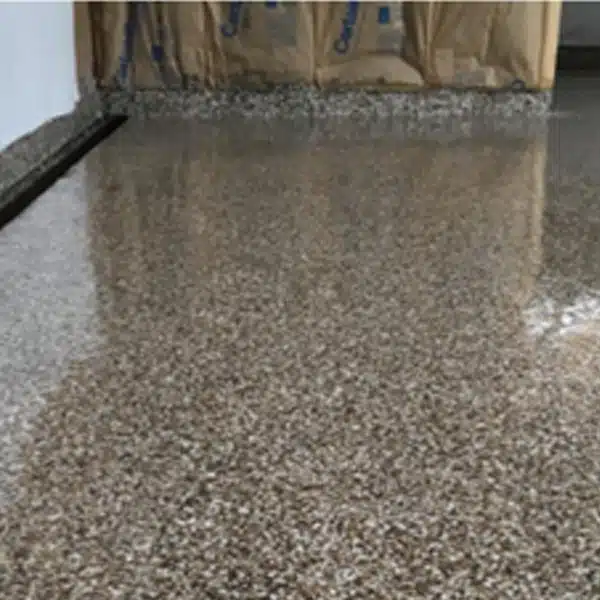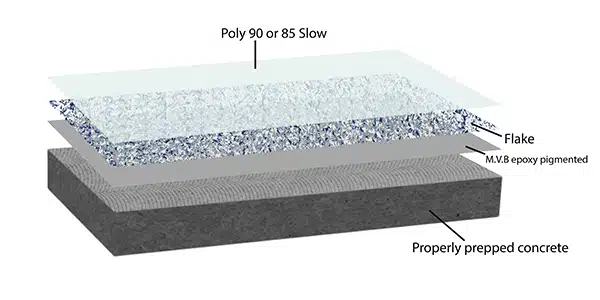
MVB POLY FLAKE
A full flake system utilizing our moisture vapor barrier epoxy as a basecoat. Perfect for floors with potential moisture problems.
MVB POLY FLAKE SYSTEM BENEFITS AND CHARACTERISTICS

- Basecoate= MVB pigmented @ 100 sqft/gal
- Flake @10 sqft/ pound (full flake)
- Topcoat = Poly 90 @ 175 sqft/gal
Step-by-Step Installation of MVB Poly Flake
Pre-Application Assessment & Preparation
1. PREP: One of the key components is to ensure that the surface is free from sealers, dirt, oils, glues, and other contaminants. It also needs a profile.
i.Do all repairs before grinding so repairs are ground flush with the floor. We recommend our Instant Medic Hard for all repairs for this coating system.
- Methods for properly preparing the concrete are:
- Using a lower grit (16, 30) metal bond diamond tool on a single headed or planetary grinder with a vacuum and grinding dry
- Vacuum floor clean. Remove any other residual dust by leaf blowing and/or microfiber wiping. Do not use water
- You are going for a floor with a light broom finish like profile that is completely profiled, bone dry, and free of contaminants
- Using a lower grit (16, 30) metal bond diamond tool on a single headed or planetary grinder with a vacuum and grinding dry
2. Apply MVB: Mix MVB by drill mixing. Mix in the proper amount of epoxy pigment (1 pigment/3 gallons).
Apply MVB to the floor by pouring the Epoxy on the floor and using a notched squeegee to spread the product and immediately backroll with an 18” , ⅜” nap roller cover. .(MVB hangs out better on the floor than in the bucket. Don’t let dwell in the bucket as this will expedite the set time) Coverage rates are approximately 50-100 sq ft per gallon. Once applied to the floor there is up to a 15 minute work time to roll it out and another 15 minutes or more to broadcast chips to the area. All times are greatly effected by temperature). Refer to data sheet for more information.
3. Broadcast Flake: Immediately after the MVB is applied to the floor the flakes need to be broadcast. Broadcast flakes to rejection by walking on the floor in spike shoes before the MVB begins to set. Multiple broadcast work best opposed to one saturation coat. No shiny spots that show the base coat should be seen when done(check the floor about an hour later to make sure no flakes “sank” in to the epoxy revealing shinny spots. Rebroadcast as needed). Note: If you multiply the sq ft of the floor times .1 , you will get the pounds of flake needed for full broadcast. I.E 800sqft x .1 = 80 pounds of flake.
4. Top Coat – Poly 90 or 85 Slow Clear: After the base coat with flakes has sufficiently set and is no longer tack free (typically 8-24 hours. Note this is greatly affected by temperature) scrap the floor by using a straight edge or use a sand screen to knock down jagged flakes. Vacuum and blow the floor clean. Apply a clear top coat of Poly 90 or 85 Slow by pouring a bead of Poly on the floor and using a flat squeegee to spread the product. Be sure and get 100 percent coverage when squeeging or dry spots can occur. Only apply what you can work with at a time as the Poly will begin to set when applied to the floor. Poly hangs out in a bucket better than on a floor. Immediately backroll with an 18”, ⅜” nap roller (coverage is approximately 175 sqft/gallon). Spike shoes are necessary to walk through the floor when using a squeegee. Add traction additive if desired.
-
- Protect area from traffic until the coating has sufficiently dried (refer to tech data for dry times)
- Add traction additive if desired
Please Read: We do not sell the ‘finished floor’. You are responsible for creating the finished product. Please contact us with any questions. Mock ups are encouraged before doing your project. The information supplied by Concrete Floor Supply about our products and uses is not a representation or a warranty. It is supplied on the condition that you will make your own tests to determine the suitability of the product for your own particular purpose. Any use or application is the sole responsibility of the user. Listed physical properties are typical and should not be construed as specifications
